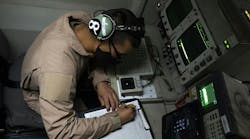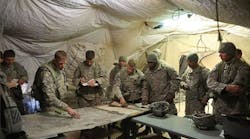by John Rhea
WASHINGTON — Technology by itself is not the answer to countering terrorism, says Paul Kleindorfer, professor of management at the University of Pennsylvania's Wharton School in Philadelphia. Rather, he says, technology must be repackaged with value added to focus on specific problems.
Kleindorfer made his commants last month at the Systems Approach to Terrorism conference at George Washington University in Washington. Kleindorfer was chairman of the conference.
Kleindorfer spoke between sessions of the conference sponsored by the Arlington, Va.-based Association for Enterprise Integration. The focus of the conference was to address the roles of the public and private sectors in building on available technology to create a viable system.
"Systems thinking would contend that the system producing terrorist activity should be examined and understood in the context of the larger systems it functions within — geopolitical, macroeconomic, religion, etc.," he told the opening session. "Actions to counter terrorism, and ultimately eliminate it for the most part, will be most effective when they take these larger systems into account."
Kleindorfer made the distinction between the public and private sector roles; the private sector, he points out, already applies new technologies for site security and risk identification and assessment. Citing such biometric technologies as iris identification, he said, "We know how to do that for health and safety. Now we must expand and elaborate."
The public sector also has applicable experience, he said, particularly in monitoring communications at widespread access points and detecting weak signals containing vital information. Similar detection methods are available within the public sector for monitoring chemical and biological threats.
In this regard, Kleindorfer commented on the glaring omission of the National Security Agency, or NSA, from the proposed organization of the Cabinet-level Department of Home Security (DHS). One explanation he offered is that NSA is still tarnished by its inability to sound the alarm of the terrorist attack last Sept. 11, and he noted that this inadequacy had existed long before that attack.
There is also the question of lines of reporting responsibility, with NSA traditionally reporting directly to the White House. The agency's role has traditionally been limited to gathering intelligence information, he said, with the interpretation of the data left to higher levels of authority.
Regarding the organizational aspects of countering terrorism, Kleindorfer focused on the difference between what he called the two-dimensional problem of getting all the cognizant agencies to participate in the total system and the vertical problem of who has the clout to get things done. The professor stressed the necessity of clout to move the typically lethargic bureaucracy.
In this context, the Cabinet-level secretary the DHS would have that clout, but so would the President's national security advisor, another Cabinet-level post. Conceivably, Kleindorfer noted, the two functions could be combined.
The conference, while stressing infrastructure rather than individual emerging technologies, did take note of the financial aspects of the overall terrorist system. According to a study by the Washington-based Center for Defense Information, Osama bin Laden has exhausted most of his own money and has come to depend on Arab supporters of al Qaeda and charitable contributions from Islamic organizations.
The center's report noted that "as of March 4, 2002, the United States has blocked $32.2 million in terrorist assets, and other countries have blocked $45.8 million for a total of $79.9 million," adding that 1,111 accounts are currently under review in the United States.




